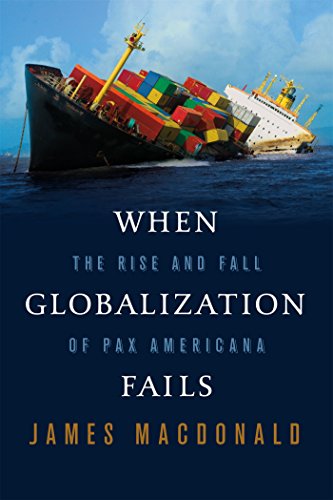
When Globalization Fails
The Rise and Fall of Pax Americana
کتاب های مرتبط
- اطلاعات
- نقد و بررسی
- دیدگاه کاربران
نقد و بررسی

November 24, 2014
In this succinct and thorough economic history, MacDonald (A Free Nation Deep in Debt) examines the theory that free trade ensures prosperity and prevents war. He finds that it might, when backed by a powerful force, such as the powerful British navy that ruled the 19th-century, or the American hegemony that marked the late 20th. Breaking down complex swaths of historical events and economic theories into manageable chunks, MacDonald posits that protectionism, imperial expansion, and increased militarism led to the bloody carnage of the First World War, and that the rise of “economic nationalism” helped incite the Second. His studied and balanced analysis cuts through the rhetoric of “national pride” to expose the pragmatic geopolitical issues at stake, explaining why the Cold War played out on fringes such as Korea and Vietnam (where Soviet expansion threatened Western access to resources), and how current tensions in the Middle East rest on a century-long struggle over access to oil. The lessons of history urge us, MacDonald concludes, to be wary of expansionist ambitions that resemble a “pre-1914 mind-set,” and to find peaceful solutions if the “hitherto unimagined destructiveness” of the previous century is not to repeat itself.

November 15, 2014
The tattered history of the notion that free, international trade ensures the permanence of peace and the disappearance of war.Macdonald-a former investment banker, now an author (A Free Nation Deep in Debt: The Financial Roots of Democracy, 2003)-returns with a two-century history, noting how, continually, events and violence have shattered the notion that trade will bring peace among nations. He begins in the 19th century and describes Pax Britannica, a time, he writes, when "it all seemed so simple." But history is not static, and France began its steady return to power after Waterloo while the United States, following the Civil War, began its own journey to the pinnacle of world power. Macdonald then devotes chapters to our major wars (world wars I and II) and shows how and why the trade-peace theory just did not obtain. He focuses on economic factors throughout: the hunger for coal, the thirst for petroleum, the passion for raw materials. He revisits the post-World War I failures of Versailles (France wanted Germany's resources; Germany wanted them back) and Germany's invasion of the Soviet Union during World War II-a move that, had it been successful (as it nearly was), would have considerably altered subsequent world history. The second half of the text deals with Pax Americana: how the United States achieved it, how it has attempted to administer it and how current events are fracturing it. The author concludes with accounts of the rises (and increasing sways) of India and China and the enduring contention and concern in the region about access to the Strait of Malacca and the control of key Pacific islands. Macdonald concludes with an eight-point list of factors in the more-or-less enduring post-World War II peace among the world's powers. He does not believe America can afford a new isolationism. Sturdy, scholarly, sharply focused, closely reasoned.
COPYRIGHT(2014) Kirkus Reviews, ALL RIGHTS RESERVED.

January 1, 2015
Macdonald, author and former investment banker, compares today's globalization with that of the nineteenth century and determines that we are . . . living in a world where the existing geopolitical order is being called into question by the rise of new powers. He asks if these rising new powers can exist without a return of the tensions that led to WWI, when the first era of globalization ended. Before the Industrial Revolution, countries had been largely self-sufficient; now they depended on imports of raw materials and on export markets for their manufactured goods, so Macdonald states, noting that when the overlay of racial barbarity is removed from WWII, what remains is the struggle for resources. The non-Communist world remained peaceful during the Cold War because of the uncontested supremacy of the U.S. Yet today this supremacy is being questioned by new powers, China and Russia. The author concludes that if the world's major nations will be able to avoid conflict, they must avoid the pitfalls of history. (Reprinted with permission of Booklist, copyright 2015, American Library Association.)

























دیدگاه کاربران